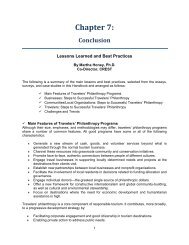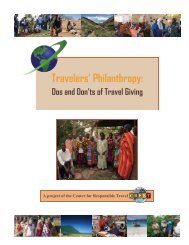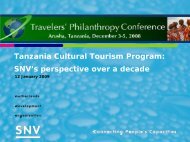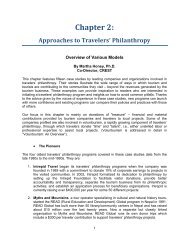Travelers' Philanthropy Handbook - Center for Responsible Travel
Travelers' Philanthropy Handbook - Center for Responsible Travel
Travelers' Philanthropy Handbook - Center for Responsible Travel
You also want an ePaper? Increase the reach of your titles
YUMPU automatically turns print PDFs into web optimized ePapers that Google loves.
sources beyond tourism, in many cases, travelers’ contributions lead to additional or ongoingdonations, either from the same traveler or from the traveler’s personal network of family,friends, and colleagues. This increases local organizations’ interest in working with touroperators to set up travelers’ philanthropy initiatives. Those surveyed also noted that travelersare more willing to contribute if they have confidence in the tour operator and know that theoperator has a long-standing relationship with a particular organization.oGoods and MaterialsWhile all the eleven organizations surveyed accept material goods, six said that donated goodsand materials “are not important to their operations.” Almost all goods and materials needed bythese organizations can be purchased locally. As one respondent stated, “Everything we need[<strong>for</strong> our organization] we can purchase locally, provided we have the funds to do so.” Buyingmaterials locally has the added benefit of supporting the local economy and employment.Another interviewee noted, “There are rare cases when the provision of material support is morepractical than simply providing financial resources.”Several said that they find it very helpful when travelers ask what kinds of items would be usefulto the organization. They listed computer materials as among the useful items. One organizationhas developed a “wish list” to help travelers in bringing donated goods and materials that will begenuinely useful. (See below the “What Can I Send?” list from the School of St. Jude) As therespondent explained, “Randomly donated cheap and inappropriate goods just become landfillor clutter up much-needed storage space.Also, unsolicited items from overseas cancost the charity unanticipated expenses inthe <strong>for</strong>m of import duties and other taxes,handling and shipping charges, etc.”Two respondents said that goods andmaterials were “extremely important,” but inboth cases these supplies were beingdonated by volunteers who knew what kindof materials were useful. For example, oneof those surveyed said that it is useful ifvolunteers donate their labor as well asconstruction materials needed to repairclassrooms.Visitor with pre-school children, Arusha, Tanzania. Credit: TheSchool of St. JudeThe clear message from this portion of the survey is that travelers should not donate goods ormaterials unless the recipient organization has specifically requested the items. Tour companiesand travelers should inquire in advance about current needs and ask if the organization hascreated a “wish list.”oVolunteersRespondents <strong>for</strong> six of the eleven organizations surveyed said that volunteer support is“important” or “extremely important.” Each organization has a different method of recruiting andengaging volunteers. Some tour operators organize volunteer activities <strong>for</strong> their clients, whilesome travelers use a volunteer placement agency and some of the local organizations recruitvolunteers themselves. Volunteers come from range of countries — the U.S. being the mostcommon — and the length of stay ranges anywhere from one week to two years. None of the169















